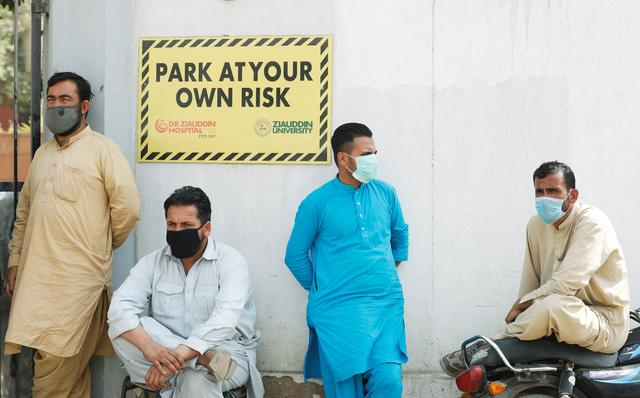Keamari toxic gas: Sindh health dept issues advisory related to 'soybean dust’ allergy
Advisory is based on ICCBS report which observes 'overexposure to soybean dust' responsible for gas deaths

Men wearing face masks wait to see their relatives who were admitted after being affected from a suspected gas leak, at the hospital entrance in Karachi. PHOTO: REUTERS
More than 200 people have been hospitalised or treated for breathing problems since Sunday after many patients complained of an unfamiliar odour.
The advisory is based on a preliminary report submitted by the International Centre for Chemical and Biological Sciences (ICCBS) at the Karachi University on Tuesday, which concluded that Keamari gas incident was happened due to “overexposure of soybean dust”.
The health department in an official document, which is available with The Express Tribune, said the findings of the ICCBS have suggested that the symptoms being experienced by Keamari residents are a result of "overexposure to soybean dust".
Gas fumigant possible cause of Keamari toxic mystery, says top govt doctor
According to the ICCBS report, which was based on the blood and urine samples of the affected people, said soybean dust related epidemics have already been reported earlier in different parts of the world associated with “morbidity and mortality”.
The experts had also collected soybean dust samples from the port area, according to the ICCBS report.
The provincial health department has directed authorities concerned to take necessary steps including training of staff to deal with the cases of soybean dust allergy.
It also said that the allergic reaction to soybean can be “frightening and even life-threatening”.
It added: "Signs and symptoms of a food allergy usually develop within a few minutes to hours after exposing to an allergen.... A severe allergic reaction is most likely to occur in people who have asthma or are allergic to other foods, such as peanuts."
The official document also mentioned the symptoms of the disease which are as follows:
- Tingling in the mouth
- Hives, itching; or itchy, scaly skin (eczema)
- Swelling in the different parts of the body
- Whezing, running nose or breathing difficulty
- Abdominal pain, diarrhea, nausea or vomiting
- Skin redness (flushing)
The provincial health department also advised citizens with asthma to wear masks, wash hands, eyes and face with water, drink ample amount of water, and rush to the hospital in case of if any symptom appear.



















COMMENTS
Comments are moderated and generally will be posted if they are on-topic and not abusive.
For more information, please see our Comments FAQ